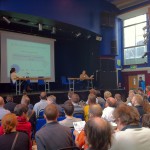first thoughts on opentech 2011
I’ve not had a chance to listen to many of the opentech talks yet. Certainly not the ones I really want to hear, so here are some preliminary thoughts.
The aim of OpenTech is to get people in the room(s) who do things, and have them talk to people who are interested in things, and see what happens:
Or, as James Cattell put it:
So, all in all, it was a pretty good day (if we ignore the catastrophe in the main room, sorry about that). People came to learn, and some left to do things.
One of the most amusing moments of the weekend, was when Mike Bracken was introduced to Puffles. Mike, the new Director Digital for Government; @Puffles2010, the grassroots community friendly (pink) Dragon Fairy tweeting in the third person. That Puffles was there was beneficial to everyone; that Mike was there says a great deal of good things about direction Government Online Services are heading.
While Tom Loosemore couldn’t make it (we wished him happy birthday in the lunchtime slides), that there was an interactive and engaging session from #alphagov says even more good things. The opentech community has been talking for years about about the kind of changes that would benefit the country. With the opportunity to deliver, we need to actually do so. It was also good to see some of the former DirectGov staff come along.
While some OpenTech speakers have long called for the type of online revolution that has now come, it’s important to remember that those who spoke against change are still around with their ideas. When we were outside Government, and they were inside, their approach to those outside could be considered as close to contempt; not only do we want to make the service better, we want them to be included in the new conversation as well. Their history and experience of what didn’t work are still valid today, and is useful to learn from.
Looking back, in practice, the underlying theme turned out to be lots of small actions were causing large unexpected outcomes. Be they projector failures, a blog post saying “Let’s March”, or whatever.
It’s easy to forget (as I had until Lisa reminded me), that WhereDoesMyMoneyGo, and the main campaign to open up COINS, is less than 2 years old.
Less than 2 years.
At OpenTech 2010, Hadley Beeman presented the key ideas behind LinkedGov. At that point, she had no funding, and it didn’t exist beyond a compelling presentation and a google form to signup for interest. 9 months on, it is a far more real project, with even bigger scope and is in the process of being delivered. The Linkedgov presentation was heard by yet another packed audience with standing room only. Much has changed in the open data scene since the first presentation, and while Hadley and Glyn look at their todo list and see it getting longer, it’s so easily to forget how much has been accomplished so far. From 3 people chatting round a table last summer, it’s come quite a long way. Lots of people have helped, but there are two vital driving voices behind it (as you’ll hear when we publish the session audio).
Part of the opendata and LinkedGov vision is to get more people using data. People who aren’t necessarily happy with some aspect, but who want to get something done. This can involve cleaning up, or asking/answering questions, and a huge number of non-technical skills; not just, as Ben Goldacre puts it, the dorks.
I would imagine that, when LinkedGov slows down a little (if ever), there will be an interesting story to tell about the journey that some of the staff have been led on by Hadley. I suspect that this story will be invaluable for the community as a learning experience. Possibly more for the people who’ve been looking at data for years.
As open data moves from the margins of policy to the centre – and we don’t get much more central than we are now – the question becomes who do we bring with us, and who do we exclude?
The answer should be we aim to bring everyone with us, and exclude no one. That is often thought of as numeracy skills, there is another aspect, and that is permission.
Historically, the open data activists have had somewhat of an affectionate contempt for T&Cs. Where permission was granted, that was great; where permission was unclear (or outright rejected), we pretty much carried on regardless. While that is true for the pioneering groups, it is wrong to say that people are not excluded by that.
Open Data, and the benefits of it, need to be for everyone. That means clear conditions, because while the loud-voiced old-timers might not care about unclear restrictions; the much larger middle, the the future of successful open data, actually do. If we exclude those people, then we will not achieve what we wish. Or, as Bill Thompson put it, we need new feathers.
We never thought that we’d be in the position that we are now in. Looking back, when we made decisions expecting small outcomes, something else happened instead.
 Disruptive Proactivity
Disruptive Proactivity